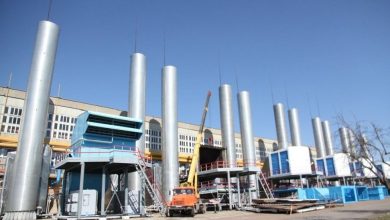Ukraine: The Knight at the Crossroads: The Knight at the Crossroads
To understand what is happening today in the economic life of Ukraine, it seems, not even given to local professionals. In any case, this is my impression after talking with several very serious professors of economics. They did not hide the fact that the chaos, the confrontation between the elites, the misinformation and the secrecy of most government actions are not amenable to logical analysis. Therefore, the picture, albeit fragmentary, can be composed of separate conversations with businessmen, scientists and ordinary ordinary people. Moreover, the opinion of the latter is often very capacious and accurate.
Position structure
In order to understand what exactly is happening in the economic life of the country, it is important to determine from what perspectives to look at real life. There are three real forces in the political and public life of today’s Ukraine.
The first calls itself Democrats, and the current government calls itself the same.
The second part is the left, led by the communists. It should be noted that this particular group clearly and consistently adheres to their views, which in other parts of the political elite resemble the Brownian movement. You can agree or disagree with their position, but in many ways it finds support.
And finally, the regionals, whose economic positions are difficult to distinguish from the positions of democrats.
As one engineer far from economics explained to me, the whole difference is in the interests of which oligarchic group who defends.
Strokes to the economic portrait
The main observation. Whatever I had to talk to, everyone emphasized only one thing – all around you had to give bribes.
There was a poll in one of the newspapers: what should I do if a police officer stops a car owner for a real or imaginary violation of the rules? More than 90% believe that you can pay off a bribe on the spot.
A very interesting conversation was with the head of a medium-sized company, which built a building with production and office areas and rents them out. It turned out that building permits and connection to communications were obtained, but the building has not been put into operation for quite some time (under all authorities – both democrats and non-democrats). The reason is simple – there is no money for bribes. Their value is comparable to the cost of construction, even if everything is done correctly.
The question arose, what to do if it becomes necessary to sell this building?
“There are no problems,” the head answered me. – There are many schemes. For example, the simplest. Agreed with the buyer about the price. He gave the money and received a receipt that he lent me the corresponding amount, the return of which I guarantee with my real estate (albeit not put into operation). The buyer then goes to court with a lawsuit for non-payment of the debt. I declare that I agree with the transfer of the building to him. The decision is drawn up by the court, as the parties agree. New owner gets property in court. What could be better?
Another more odious example was given by another businessman, moreover, connected not with the pure greed of officials, but with state requisitions.
A small company has been training the unemployed for many years. She chose a very interesting niche – she was preparing a nanny for small children, governesses, butlers, etc. For several years, trained, issued certificates and employed about seven hundred people. We decided to receive a grant from the state for the next batch of unemployed, and there was already a group of interested listeners.
However, now, according to the new rules, even a small state order must be passed through the tender chamber, which was created, according to the state, to exclude corruption. In this chamber, at first they asked to pay a fairly decent amount for the forms necessary for participation in the competition, then already a very large amount for the participation itself. Then another problem arises – more than one applicant must participate in the competition. And this company has no competitors, no one teaches in this area. So you need to give a bribe to any company and pay all its expenses to participate in this competition. In addition, as my interlocutor noted, the official will also want to get something in his pocket. Thus, there is no longer any economic sense in engaging in such activities.
The result is obvious – the company was closed, training was stopped.
This is the state’s fight against corruption, as various people have explained to me.
There are many similar examples from various spheres of economic life, but the overall picture is already quite clear.
Just observations
Two decades ago, Ukraine was one of the most developed countries in Europe, not only in terms of iron and steel smelting, the state of agriculture, but also in the field of engineering and a number of high-tech industries.
Now, as local newspapers write, the country is in the second hundred of the world ranking for economic development.
None of those who had to speak with anyone understands what is happening with gas supplies from Russia. Many believe that the supplier’s problem is in a clean economy, and in Ukraine everything is transferred to the political plane. Moreover, the struggle is already going on within the democratic coalition itself, that is, between the president and the prime minister.
It seems that the population is already tired of an endless series of elections, conflicts in the highest echelons of power, increasing corruption, which is aggravated by the fact that after every re-election and the coming to power of another party, there is a massive change of officials, even at the lowest levels of government.
One taxi driver said that you won’t have time to get used to the official, find out how much he needs to be given, how another comes here and asks for more.
In the real economy, it is a mixture of a tough market and almost communist complacency.
So, in Kiev, a ticket for public transport, including the metro, costs only fifty kopecks (about one crown), heating a small apartment – about one hundred fifty – two hundred crowns. At the same time, food prices are close to ours.
The cost of real estate in Kiev is now much higher than in Tallinn. They build a lot there, and most of the buildings really decorate the city. The explanation is simple: more than forty-five million people live in the country, more than two and a half million live in Kiev, and many wealthy people from the periphery seek it.
The general feeling is that the country has a difficult choice in the development path, and the current power elites are busy solving their local problems.
Moreover, the people no longer have faith in either the democrats or their opponents.
Lev GOLUB, Professor, Institute of Economics and Management
This post is also available in:
 English
English  Русский (Russian)
Русский (Russian)



